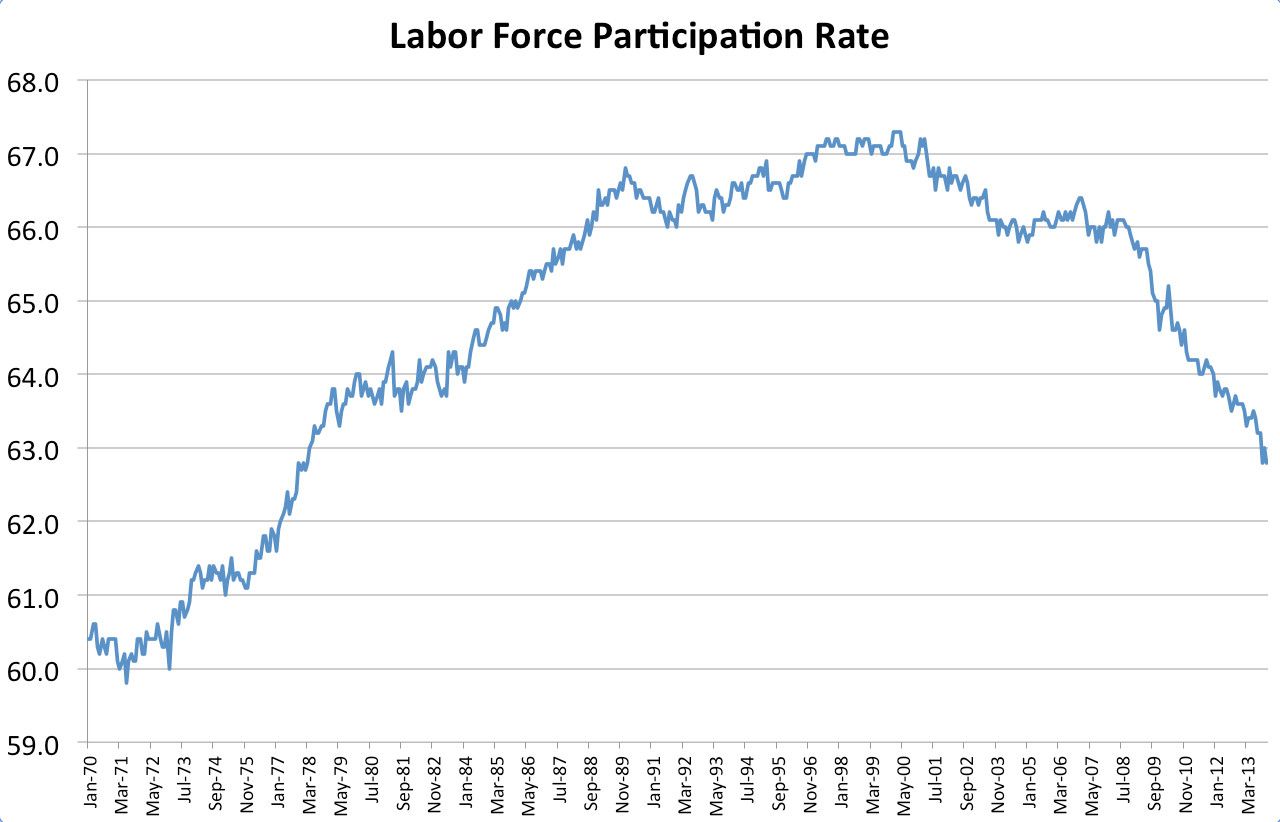The number of jobs created in the month of December fell far short of the expected 200,000 and unemployment (U-3) fell to 6.7% the lowest it has been since November 2008. I think the word “disappointing” is an understatement:
Stock futures fell after the report was released.
The slowdown in hiring could cause the Federal Reserve to rethink its plans to slow its stimulus efforts. The Fed decided last month to cut back on its monthly bond purchases by $10 billion. It could delay further reductions until it sees evidence that December’s weak numbers were temporary.
Cold weather may have slowed hiring. Construction firms cut 16,000 jobs, the biggest drop in 20 months.
Still, December’s hiring is far below the average gain of 214,000 jobs a month in the preceding four months. But monthly gains averaged 182,000 last year, nearly matching the previous two years.
The proportion of people working or looking for work fell to 62.8 percent, matching a nearly 36-year low.
As Huffington Post‘s Mark Gongloff writes “unemployment is falling for al the wrong reasons”
One reason for the big drop in unemployment in December was that many, many people dropped out of the labor force — 347,000, to be exact. They stopped looking for work, which made them no longer “unemployed” in the eyes of the Bureau of Labor Statistics.
Click on image to enlarge.Some of this is due to the fact that Baby Boomers retiring — but only some. Most of it has to do with the fact that the economy is still too weak to create enough jobs to draw people into the market. This is most clearly evident in the fact that younger people are leaving the labor force, too — or never even entering it — because they can’t find jobs.
Meanwhile, Charles Pierce reports that the Republicans keep finding new ways for “screwing the unemployed”
Rob Portman of Ohio, who might have been the 2012 Republican vice-presidential nominee had the Romney people not been terrified that, if they put Romney and Portman on the same stage together, the earth would spin into a dark region of the galaxy made up only of the primeval tedium whence the cosmos came, and we’d all come out named Tagg or something. Now, though, he’s back in the Senate being “reasonable,” which means that Portman felt free to allow an extension of unemployment benefits to come to a vote in the Senate, so Portman then could devise a way to sabotage those benefits because that is reasonable and bipartisan and centrist, and nobody will yell at him on the radio too loudly back in Columbus or Elyria.
It depends, he said, on whether lawmakers find a way to pay for the $6.4 billion cost. Wednesday, Portman said he has just such a way. He said that people drawing two other kinds of government aid — Social Security disability insurance payments (SSDI) and trade adjustment assistance (TAA) — can simultaneously get unemployment benefits, which he thinks is wrong.It depends, he said, on whether lawmakers find a way to pay for the $6.4 billion cost. Wednesday, Portman said he has just such a way. He said that people drawing two other kinds of government aid — Social Security disability insurance payments (SSDI) and trade adjustment assistance (TAA) — can simultaneously get unemployment benefits, which he thinks is wrong.
The “compromise” on offer is to help the unemployed while stoking the usua; anger at a vague claque of disabled freeloaders elsewhere. Where ever did Portman get the idea that the country’s economy is beset by double-dipping cripples?
The Labor Department reported Friday that in December, the average unemployed person had been out of work for more than 37 weeks.
Meanwhile, “Christiegate.”


 On this day in 1901,
On this day in 1901,
Recent Comments